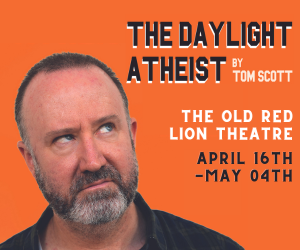In nineteenth-century Holland, a leading neuroscientist tries to ‘civilise’ a wild girl who was raised by lions in the heart of Borneo. Broadway Baby’s Theatre Editor, Liam Rees, met some of the creators of Sisters Grimm’s latest show, Lilith: The Jungle Girl – Ash Flanders, Candy Bowers and Declan Greene – to talk about queerness, colonialism and the differences between Australian and British audiences.
I can see people spasm sometimes when they’re laughing so hard
Liam: The show’s just finished, how are you feeling?
Candy: It’s such an interesting work. You can’t really ever think you’ve got it completely under your belt because there’s still moments where you could slip and break your head.
Ash: That’s not a metaphor. There’s literal danger.
Candy: So much relies on the crowd, that’s what I’ve noticed in Edinburgh. You can almost feel the crowd’s sensibilities: with you, against you, coming to something with you. I can see people spasm sometimes when they’re laughing so hard, they’re hooked on one little thing and they can’t get over it. The show moves pretty fast, so like suddenly we’re lions or something.
Ash: The theatrical ketamine kicks in!
Candy: But yeah it’s very tiring, very high-energy.
Liam: What was the rehearsal process like?
Declan: The dramaturg on this show is Nakkiah Lui and she is a Gamilaroi/Torres Strait Islander woman, so she’s indigenous Australian, and she was one of the people who was really important in the shaping of this work. She’s a phenomenal playwright but also a real political provocateur in Australia, so she was a great sounding board for some of the politics in the work on the matters of colonialism and trauma.
Ash: And it’s a very delicate balance because the literal mess of the stage [design] means the show[‘s structure and dramaturgy] has to appear tight and taught because if that becomes sloppy or messy then it actually does look like a slimy mess.
Liam: In Britain we don’t really engage with our colonial past so have you noticed a difference between British and Australian audiences?
Candy: In Australia, I always bring my friends and colleagues [who are] involved in black feminism and they have their reading of it about colonialism, but the queer folks have their reading of the outsider. Because I’m a South African playing a Dutchman is very interesting for me, [with Dutch and British colonists] having played such a strong part in South Africa and the similarities with Australia are huge. So then you get back here [in Edinburgh] and you go Is there any unpacking of that? because in South African work there definitely is among Dutch Afrikaner artists. Which is interesting, because here I’ve seen a lot, we just saw salt. today, Woke and The Fall so you see that positionality of the slave or the colonised but, other than this work, I haven’t seen the other perspective.
Declan: Australia is still grappling with its colonial legacy and there’s a huge conversation around Australia Day, our national holiday which celebrates the birth of White Australia, so there’s equivalences in Australian politics where the First Nations say You wouldn’t expect Jewish people to celebrate the Holocaust.
Ash: Also same-sex marriage is facing a lot of backlash.
Declan: So Australia’s definitely at a political crossroads at the moment – which is the cauldron that the body of this work grew out of. So Lilith isn’t supposed to be a figure that stands in for one particular kind of oppression, she’s an intersection of different kinds of otherness.
Ash: Yeah, all the symbols are scrambled and we did that to make the audience reevaluate what they’re looking at and think critically, hopefully in an entertaining way, about what might be the meaning behind all this. And it’s interesting that some audiences really get behind that and go that journey with it and some still want to be passive.
Liam: But the absurd comedy means it's never too heavy, it helps sneak in the politics.
Ash: That’s such a touchstone here [in the UK]: the refusal to actually commit, like doing ridiculous voices and costumes that do not make sense. We try to balance the jokes. It probably seems like there’s a lot of stupid jokes but there’s actually a lot more [deeper meanings]. Sisters Grimm, which is me and Declan, have always found our own audience that are typically non-average theatregoers, showing them that theatre can be live and stupid and funny and smart and grossly immature at the same time.
Candy: It’s funny to think that theatre has to fit in some kind of box. I mean this zeitgeist of conservatism is upon us as a world but if we can’t screw with people, if we can’t make people go How do I feel? and in the piece there are these expectations, even in the flyer, that Ash is going to look like that hot drag queen in the picture. So you’ve got loads of queers who think they’re non-conforming yearning to see that pretty lady, that Caitlyn Jenner. And in this whole festival there’s this dramaturgy of what it is to be a man or a woman. I think this work does something very interesting.
Declan: That’s what’s felt nice about this whole Trav Festival, it does feel like there’s a major conversation occurring in this building, and beyond that there’s this tipping point crossing over from academia and activism and is moving over to theatre that has momentum and real purpose. It really feels like that’s really intertwined with excellence as well, so shows like Hot Brown Honey, salt. but it’s not just good politics, it’s also exceptional shows and I think the radicalism and activism is intertwined in the craft.











